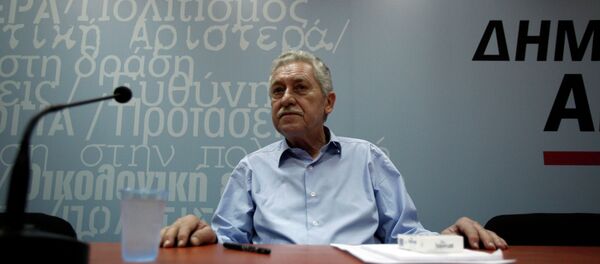MOSCOW, January 14 (Sputnik), Anastasia Levchenko — Greece's efforts to improve its economy have already yielded results, and the so-called Troika of bailout creditors will resume talks with the new government to ensure it continues economic reforms, an EU official told Sputnik Wednesday.
The International Monetary Fund (IMF), the European Commission and the European Central Bank (ECB) form the Troika that has been helping the EU member states which suffered most from the eurozone crisis (Greece, Ireland, Portugal, Spain) since 2010.
"In the past few years Greece has undertaken remarkable efforts to reform its economy and put its public finances onto a sustainable path. These efforts have already begun to bear fruit," an EU official told Sputnik.
"Greece is now in the midst of an election campaign. The European Commission, ECB and IMF will resume discussions with the new government, once a new government is formed, to determine how it intends to implement the remaining elements of the program," the source said.
According to the official, as a result of the reform policy, the country's total budget deficit has been reduced to 1.6 percent of GDP in 2014, compared to 15 percent in 2009. Moreover, in 2013 state revenues exceeded expenditures, and currently Greece has the highest primary surplus in the eurozone after Germany.
On Wednesday, Greece announced that its primary budget surplus, which does not take into consideration interest payments, for 2014 stands at €1.9 billion ($2.24 billion). Although this sum is lower than the target that was set by the government, analysts say Greece is still going to meet its budget goals.
Moreover, the Greek economy started to grow in 2014, and this tendency is going to continue in 2015 (expected growth of 2.9 percent) and in 2016 (3.7 percent), according to the EU official.
Greece's negotiations with the European Commission, the European Central Bank and the International Monetary Fund were suspended after the country failed to elect a president in the final round of voting in December. As a result, the Greek parliament was dissolved, and a snap election will take place on January 25.
With the opposition party Syriza leading in the polls, there have been growing concerns that Greece would exit the eurozone after the new government is formed. Syriza promised to reconsider the country's agreements with foreign creditors.




